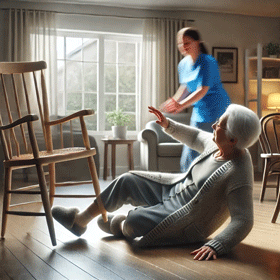Depression Is a Risk Factor for Falls Among Nursing Home Residents, Study Finds
 What are you considering in your risk factors for your residents when evaluating them for their safety concerns? Are you including depression? According to a report published, depression should be considered in your assessment of your residents.
What are you considering in your risk factors for your residents when evaluating them for their safety concerns? Are you including depression? According to a report published, depression should be considered in your assessment of your residents.
A clinical daily news article by McKnights released December 9 titled Depression is a risk factor for falls among nursing home residents, study finds. The article outlines the report that reviewed seven studies published in seven countries. Results showed that depressive symptoms and falls among older adults were common in nursing homes. According to the article, older adults with depression can have a higher risk of falling due to behavioral, neuromuscular, or pathological pathways. Depressed residents may be less active, which can also lead to those falls.
The full report and research, Relationship Between Depression and Falls Among Nursing Home Residents: Integrative Review, is available from the Interactive Journal of Medical Research.
Medical Mutual offers a comprehensive practice tip Falls: Prevention/Reduction of Falls and Fall-related Injuries. Explore the guide for actionable insights.
This article falls under Operational in the Enterprise Risk Management (ERM) risk domains.
The business of health care is the delivery of care that is safe, timely, effective, efficient, and patient-centered within diverse populations. Operational risks relate to those risks resulting from inadequate or failed internal processes, or systems that affect business operations. Examples include risks related to: adverse event management, credentialing and staffing, documentation, chain of command, lack of internal controls, supply chain and identification of existing opportunities within management oversight.
